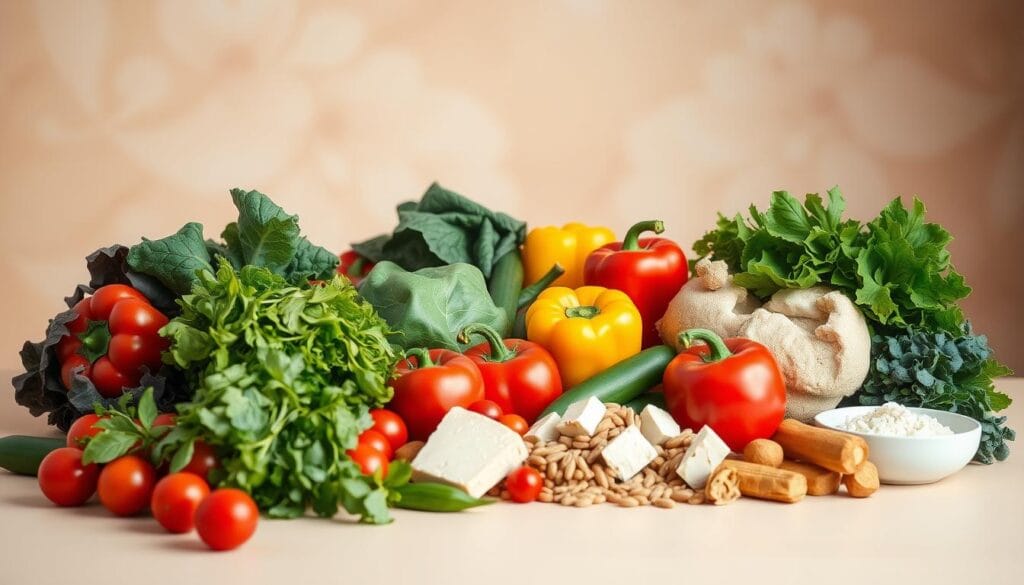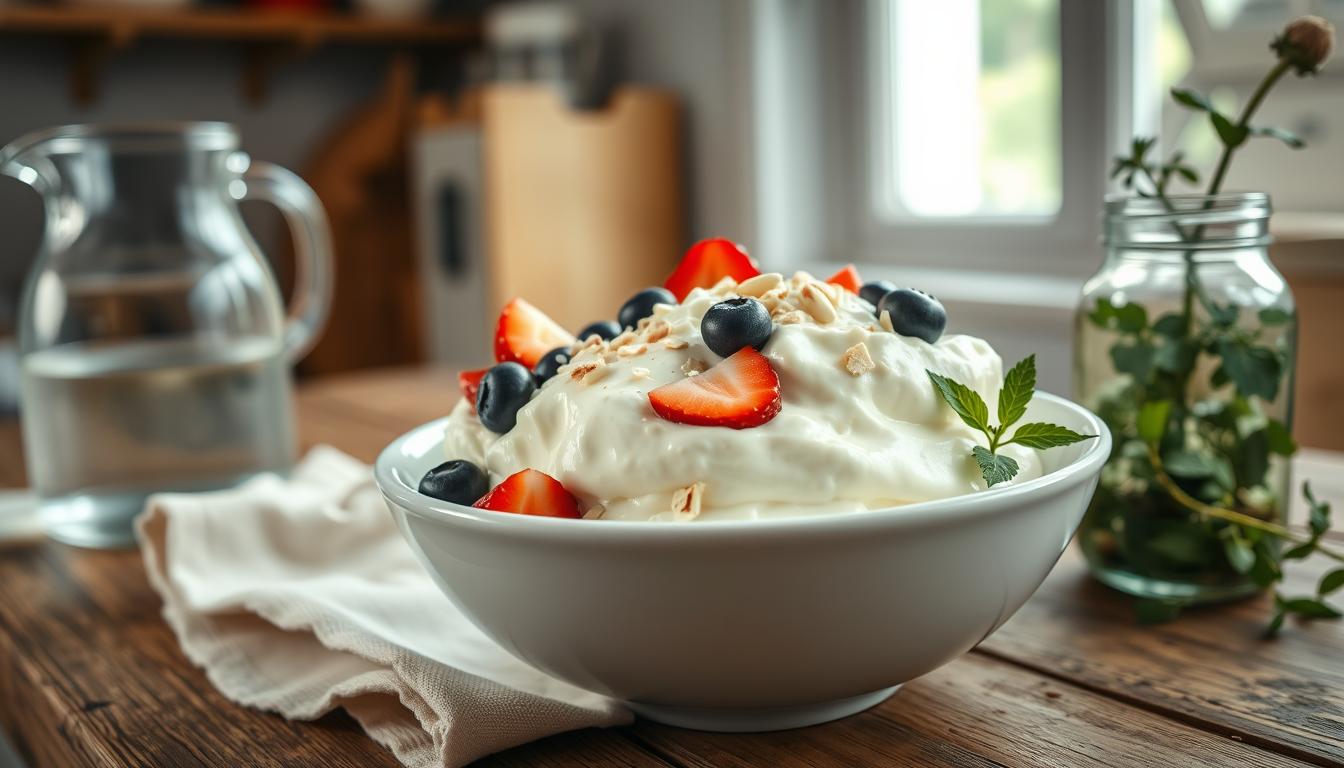Menopause can be tough, but a vegan diet can help. It’s a great way to manage this big change in life. Women usually hit menopause around 50, and it brings big changes due to less estrogen.
Switching to a plant-based diet can really help. It can ease symptoms like hot flashes and weight changes. It also helps with the body’s metabolic shifts during menopause.
Going vegan is more than just cutting out meat and dairy. It’s about taking care of your whole health. A vegan diet can help with temperature control, bone health, and heart health. It’s a powerful ally during this time.
Table of Contents
Understanding Menopause and Its Natural Changes

Menopause is a big change for women, happening between the late 40s and early 50s. It ends your reproductive years and brings big hormonal changes. These changes affect your health and how you feel.
The Role of Hormones During Menopause
Menopause brings big hormonal shifts. Your estrogen and progesterone levels drop. This affects your metabolism, bones, and mood.
- Estrogen levels decrease gradually
- Hormonal balance becomes disrupted
- Metabolic processes slow down
Common Menopausal Symptoms
Women face many symptoms during menopause. A vegan diet can help manage these issues well.
- Hot flashes
- Mood changes
- Weight fluctuations
- Sleep disruptions
- Reduced muscle mass
Why Traditional Diets May Fall Short
Regular diets often don’t meet menopause’s unique needs. A vegan diet for menopause is a good plan. It helps balance hormones, gives important nutrients, and eases symptoms with plant-based foods.
Nutrition plays a crucial role in navigating menopausal changes successfully.
Benefits of a Vegan Menopause Diet Plan

Starting a vegan diet can change your health journey during menopause. It offers big benefits that traditional diets can’t match.
Plant-based meals can help you manage your weight well. Studies show women on vegan diets lose about 2.5 kg more than those on vegetarian diets. This is because vegan foods are full of nutrients but low in calories.
- Supports healthy weight management
- Reduces chronic inflammation
- Promotes optimal nutrient absorption
- Helps balance hormonal changes
Protein is key during menopause. Vegan foods can give you all the protein you need. For a 70 kg woman, aim for 85-140g of protein daily from:
- Legumes
- Tofu
- Tempeh
- Seitan
- Nuts and seeds
The vegan diet also boosts heart health and lowers disease risk. It improves your gut health. Eating whole, nutrient-rich plant foods helps you stay healthy and full of energy during menopause.
Managing Hot Flashes Through Plant-Based Nutrition
Hot flashes can be tough during menopause. But, a vegetarian diet can help a lot. Studies show that eating plants can make hot flashes less frequent and less severe.
New research shows how food choices can help. In one study, people on a special diet saw big improvements:
- 79% decrease in total hot flashes
- 84% reduction in moderate-to-severe hot flashes
- 59% of participants became completely free of severe symptoms
The Power of Soy Phytoestrogens
Soy is a big help for menopause symptoms. Phytoestrogens in soy help control body temperature and lessen hot flashes. Eating 20-60 grams of soy a day is recommended for the best results.
Best Plant Foods for Temperature Regulation
| Food Source | Soy Protein (grams) |
|---|---|
| Soy Burger | 10 |
| Tofu (3 oz) | 6-13 |
| Edamame (2/3 cup) | 6 |
| Tempeh (1/2 cup) | 16-22 |
Practical Tips for Hot Flash Relief
Your vegetarian diet can make a big difference. Here are some tips:
- Eat at least five servings of fruits and vegetables every day
- Add soy-based proteins to your meals
- Drink cool water to stay hydrated
- Try chia seeds for omega-3 fatty acids
“Food is not just nutrition; it’s your body’s natural medicine during menopause.” – Nutrition Experts
By choosing a plant-based diet for menopause, you can manage hot flashes better. This can also improve your overall life quality.
Weight Management During Menopause with Plant-Based Foods
Managing weight during menopause can be tough. About 60-70% of women gain weight during this time. A vegan diet can help with these changes.
Plant-based foods are key to fighting midlife weight gain. They offer nutrient-rich, low-calorie options. These help with weight management during menopause.
- Increase soluble fiber intake to reduce belly fat
- Focus on low-glycemic index foods
- Prioritize protein-rich plant sources
- Practice portion control
Studies show vegan diets are great for weight control. A study by the Physicians Committee found women lost over 12 pounds in 14 weeks on a low-fat plant-based diet.
| Dietary Strategy | Weight Management Benefits |
|---|---|
| High Fiber Intake | Reduces belly fat by 3.7% per 10g daily |
| Low-Glycemic Foods | Reduces cardiovascular and diabetes risk |
| Protein-Rich Plants | Maintains muscle mass and metabolism |
For your vegan diet, eat 0.8-1 gram of protein per pound of body weight. Choose nutrient-dense, whole plant foods. Aim for about 1,500 calories a day for healthy weight loss.
By using a vegan diet wisely, you can manage your weight. You’ll also support your metabolic health and feel confident during menopause.
Essential Nutrients in Your Vegan Menopause Diet
Planning your diet during menopause is key, especially if you’re vegan. Your body needs certain nutrients during this time. It’s important to eat plant-based foods that are rich in nutrients to stay healthy.
Knowing what nutrients you need can help you make healthy vegan meals. These meals can help manage your symptoms and keep your body nourished.
Plant-Based Calcium Sources
Calcium is vital for bone health during menopause. Luckily, there are great plant-based options:
- Fortified plant milks
- Dark leafy greens
- Calcium-set tofu
- Almonds and almond butter
- Sesame seeds
Vitamin D and B12 Essentials
Menopause requires certain vitamins for bone health and overall wellness. Vitamin D and B12 are especially important for vegans.
| Nutrient | Vegan Sources | Daily Recommendation |
|---|---|---|
| Vitamin D | Fortified plant milks, mushrooms | 600-800 IU |
| Vitamin B12 | Nutritional yeast, fortified foods | 2.4 mcg |
Protein Requirements for Menopausal Women
Protein is important for muscle health during menopause. Eat 1-2 grams of protein per kilogram of body weight from plant-based sources:
- Legumes and beans
- Quinoa
- Tempeh and tofu
- Seitan
- Plant-based protein powders
Tip: Spread out your protein intake throughout the day. This helps keep muscles strong and energy levels up.
Boosting Heart Health with Vegan Nutrition
Your heart health is key during menopause. A plant-based diet can protect your heart from risks that grow with age. Studies show that a vegan diet can greatly improve heart health through smart food choices.
Plant-based diets offer many heart benefits:
- They naturally lower cholesterol levels.
- They reduce inflammation in blood vessels.
- They help keep blood pressure healthy.
- They lower the risk of heart disease.
Research shows amazing heart health improvements in those eating plant-based. Studies show that eating more plant-based foods can lower heart disease risk.
Plant-based diets are low in bad fats and high in nutrients that are good for the heart.
Include these heart-protective foods in your vegan diet:
- Whole grains
- Leafy green vegetables
- Nuts and seeds
- Legumes
- Berries and fruits full of antioxidants
The TLC diet matches well with a vegan diet. It suggests eating less than 7% of daily calories from saturated fat. By choosing a plant-based diet, you can help keep your heart healthy during menopause.
Addressing Bone Health Through Plant-Based Eating
Menopause brings big changes to women’s bodies, affecting bone health. It’s key to have a diet that keeps bones strong.
The EPIC-Oxford study looked at 55,000 people for 17 years. It found vegans had about 20 more bone fractures per 1,000 than meat-eaters.
Preventing Osteoporosis Naturally
To keep bones strong during menopause, you need a good plan. A vegan diet can help lower the risk of bone loss.
- Eat foods high in calcium
- Take vitamin D supplements
- Make sure you get enough protein
- Do exercises that make your bones stronger
Best Vegan Foods for Strong Bones
Choosing the right foods is key for bone health. Here are some top picks:
- Fortified plant milks: Great for calcium
- Dark leafy greens: Kale, collards, and spinach
- Tofu and soy products: Full of minerals good for bones
- Nuts and seeds: Almonds, chia seeds have important nutrients
Katherine Tucker, PhD, says eating calcium from whole foods is better. A well-planned vegan diet can help keep bones strong and lower fracture risks.
Mental Wellness and Mood Support with Vegan Foods
Menopause can be tough on your emotions. A vegan diet can help a lot. It supports your mental health during this big change.
What you eat affects your mood a lot. Hormonal shifts can lead to depression and anxiety in up to 50% of women. Eating right can help manage these feelings.
- Nutrient-rich plant foods that support mental wellness
- Brain-boosting ingredients to combat mood swings
- Strategies for emotional balance through nutrition
Plant-based foods are full of nutrients that boost your mood. Omega-3 fatty acids from chia seeds and walnuts are good for your brain. Legumes have amino acids that help with mood. Dark leafy greens have magnesium, which helps with stress and sleep.
“Food is more than nutrition – it’s medicine for the mind and body.” – Plant-Based Nutrition Expert
The brain uses a lot of energy, so eating well is key. A 2023 study from The University of Nottingham found that fiber can help with depression. Eating vegan can naturally support your mental health.
Here are some tips for better mood through diet:
- Eat whole grains for steady energy
- Choose foods high in B vitamins
- Drink herbal teas and water to stay hydrated
- Practice mindful eating
Your mental health is important. A vegan diet can help you face menopause’s emotional challenges with strength and grace.
Conclusion
Starting a vegan menopause diet plan can change your journey through menopause. Studies show that eating plants can help a lot during this big change. Women aged 45 to 55 can get healthier by adding vegan recipes to their meals.
Every woman’s menopause is different, so a special diet plan is needed. A vegan diet has antioxidants and phytoestrogens that help with stress, hormones, and aging. It can also help with hot flashes, weight, and bone health.
It’s important to talk to doctors about your diet. They can help because everyone’s body is different. A vegan diet can help you feel better and more confident during menopause.
Choosing a vegan diet is more than just food. It’s a way to take care of your health for the long term. It can help prevent diseases and keep you healthy during this big change.


